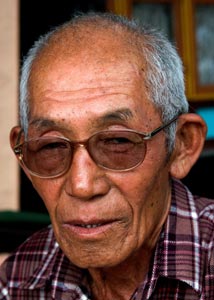Name: Thupten
(Alias: No)
Gender: Male
Interview Age: 68
Date of Birth: 1939
Birthplace: Lhasa, Utsang, Tibet
Year Left Tibet: 1959
Profession: Monk
Monk/Nun: Previously
Political Prisoner: No

Interview No.: 36
Date: 2007-06-28
Language: Tibetan
Location: Lugsung Samdupling Settlement, Bylakuppe, Karnataka, India
Categories: Resistance and Revolution
Keywords: childhood memories, Chinese -- first appearance of, Chinese army -- invasion by , escape experiences, March 10th Uprising, monastic life, refugee in India -- life as, Utsang
Summary:
Thupten's earliest memories of the Chinese are from when he was a monk. He explains how the Chinese befriended the monasteries to gauge the actual power of the monks. He believes the Chinese feared the monks more than the Tibetan Army, which had limited arms and manpower.
Thupten was in Lhasa in March of 1959 and describes the uprising of the Tibetans, who stood united against the Chinese' plot to kidnap His Holiness the Dalai Lama. During the mass uprising of March 10, 1959, a Tibetan was publicly stoned to death at Norbulingka for conspiring with the Chinese to kidnap His Holiness the Dalai Lama.
When the war began in Lhasa, Thupten and many young monks stood guard at the Sera Tseri. After seven days, the monks learned that Lhasa was lost to the Chinese and that His Holiness had left for a foreign country. They began their own escape, walking for over a month and evading the bombs dropped daily by Chinese airplanes. In contrast to his early tranquil days as a monk at Sera Monastery in Tibet, Thupten joined the Indian Army and fought in Bangladesh.
Interview Team:
- Martin Newman (Interviewer)
- Lhakpa Tsering (Interpreter)
- Tsewang Dorjee (Videographer)

